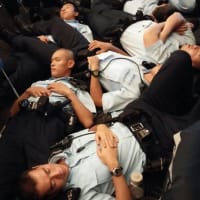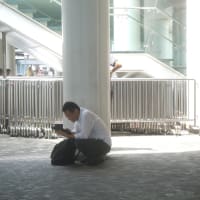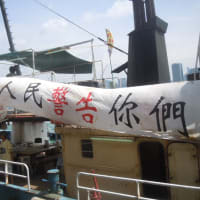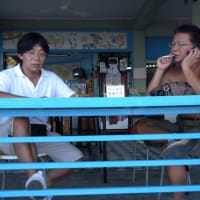China Executes a Tibetan in Connection With Bombing Attacks
(New York Times 2003.01.28 International)
http://www.nytimes.com/2003/01/28/international/asia/28TIBE.html
By ERIK ECKHOLM
BEIJING, Jan. 27 - A 28-year-old ethnic Tibetan accused of plotting bomb attacks was executed on Sunday, soon after an appeals court in Sichuan Province upheld his December conviction, officials said today.
The executed man, Lobsang Dondrub, was arrested near the scene of a bombing in Sichuan's capital city of Chengdu last spring that had wounded 12 people, officials said. The police said he had also confessed to involvement in a string of other bombings over the last two years in the mainly Tibetan region of western Sichuan, causing one death.
But Tibetan advocates in China and abroad said that the police had not made public any evidence and that the trial was a sham.
Chinese officials have described Lobsang Dondrub as an "assistant" to a prominent monk in the region, Tenzin Deleg Rimpoche, 52, who was convicted at the same December trial of involvement in bomb plots and Tibetan separatism. The monk's sentence of death with a two-year suspension, which may be reduced to a lengthy prison term, was also affirmed by the court on Sunday.
Tenzin Deleg Rimpoche has proclaimed his innocence. His supporters also said that Lobsang Dondrub, while he had at one point studied under the elder monk, was not his close associate and that the authorities appeared to be using the case to silence a popular senior leader.
"This moves Tibetan-Chinese relations into a new phase," said Robert Barnett, an expert on Tibet at Columbia University. "The authorities had carefully avoided openly using the death sentence for political offenses for more than a decade."
Other monks have been arrested in connection with the same bombing accusations, local leaders said.
---
China Executes Tibetan for Bombings
---Second Suspect's Appeal Is Rejected
(Washington Post 2003.01.28 Page A18)
http://www.washingtonpost.com/wp-dyn/articles/A52442-2003Jan27.html
By John Pomfret
Washington Post Foreign Service
Tuesday, January 28, 2003; Page A18
BEIJING, Jan. 27 -- China executed a former Tibetan monk convicted of carrying out a string of bombings to protest China's rule over Tibet, a case that has prompted international criticism of China's judicial system and treatment of its restive Tibetan minority, authorities reported today.
Lobsang Dhondup, 28, was executed Sunday afternoon in Ganzi, a city near the Tibetan border in Sichuan province, immediately after a court upheld his death sentence, according to an official at Ganzi Intermediate People's Court.
The Sichuan Provincial High People's Court also rejected an appeal by Tenzin Deleg Rinpoche, 52, a senior Buddhist monk, and affirmed his suspended death sentence, the official New China News Agency reported. A suspended death sentence usually means life in prison.
The case against the two men has prompted an outcry from organizations committed to supporting Tibet. Last month in Beijing, Assistant Secretary of State Lorne W. Craner expressed "deep concern" about the severity of the sentences and the possible lack of a fair trial.
Tenzin and Lobsang were detained following a bomb blast last April in Chengdu, the capital of Sichuan province. Lobsang was detained near the site of the explosion. Tenzin's links to the blast have never been clarified other than the allegation that he at one time served as Lobsang's teacher, Tibetan activists said.
Ten other Tibetans have been detained in connection with that blast and others in the region, human rights organizations said, making this case one of the biggest crackdowns in recent years on Tibetan activists. At least one person was killed in the attacks, Chinese media have reported.
Tenzin, who is a religious figure of some influence in the Tibetan regions of Sichuan, was held incommunicado for eight months until the day of the trial. Two prominent Chinese lawyers, Zhang Sizhi and Li Huigeng, were denied permission to represent Tenzin in his appeal process, human rights organizations said. Tibetan activists alleged that Tenzin and Lobsang were tortured throughout their detention and that whatever confessions they might have made were coerced. Human rights organizations say such treatment is common in China.
China maintains that Tibet has been part of its territory since the 13th century. Many Tibetans reject this argument and contend that Tibet should be an independent country. Tibet's spiritual leader, the Dalai Lama, fled China in 1959 following a crackdown against a Tibetan uprising that began near Ganzi, the site of Sunday's execution.
(New York Times 2003.01.28 International)
http://www.nytimes.com/2003/01/28/international/asia/28TIBE.html
By ERIK ECKHOLM
BEIJING, Jan. 27 - A 28-year-old ethnic Tibetan accused of plotting bomb attacks was executed on Sunday, soon after an appeals court in Sichuan Province upheld his December conviction, officials said today.
The executed man, Lobsang Dondrub, was arrested near the scene of a bombing in Sichuan's capital city of Chengdu last spring that had wounded 12 people, officials said. The police said he had also confessed to involvement in a string of other bombings over the last two years in the mainly Tibetan region of western Sichuan, causing one death.
But Tibetan advocates in China and abroad said that the police had not made public any evidence and that the trial was a sham.
Chinese officials have described Lobsang Dondrub as an "assistant" to a prominent monk in the region, Tenzin Deleg Rimpoche, 52, who was convicted at the same December trial of involvement in bomb plots and Tibetan separatism. The monk's sentence of death with a two-year suspension, which may be reduced to a lengthy prison term, was also affirmed by the court on Sunday.
Tenzin Deleg Rimpoche has proclaimed his innocence. His supporters also said that Lobsang Dondrub, while he had at one point studied under the elder monk, was not his close associate and that the authorities appeared to be using the case to silence a popular senior leader.
"This moves Tibetan-Chinese relations into a new phase," said Robert Barnett, an expert on Tibet at Columbia University. "The authorities had carefully avoided openly using the death sentence for political offenses for more than a decade."
Other monks have been arrested in connection with the same bombing accusations, local leaders said.
---
China Executes Tibetan for Bombings
---Second Suspect's Appeal Is Rejected
(Washington Post 2003.01.28 Page A18)
http://www.washingtonpost.com/wp-dyn/articles/A52442-2003Jan27.html
By John Pomfret
Washington Post Foreign Service
Tuesday, January 28, 2003; Page A18
BEIJING, Jan. 27 -- China executed a former Tibetan monk convicted of carrying out a string of bombings to protest China's rule over Tibet, a case that has prompted international criticism of China's judicial system and treatment of its restive Tibetan minority, authorities reported today.
Lobsang Dhondup, 28, was executed Sunday afternoon in Ganzi, a city near the Tibetan border in Sichuan province, immediately after a court upheld his death sentence, according to an official at Ganzi Intermediate People's Court.
The Sichuan Provincial High People's Court also rejected an appeal by Tenzin Deleg Rinpoche, 52, a senior Buddhist monk, and affirmed his suspended death sentence, the official New China News Agency reported. A suspended death sentence usually means life in prison.
The case against the two men has prompted an outcry from organizations committed to supporting Tibet. Last month in Beijing, Assistant Secretary of State Lorne W. Craner expressed "deep concern" about the severity of the sentences and the possible lack of a fair trial.
Tenzin and Lobsang were detained following a bomb blast last April in Chengdu, the capital of Sichuan province. Lobsang was detained near the site of the explosion. Tenzin's links to the blast have never been clarified other than the allegation that he at one time served as Lobsang's teacher, Tibetan activists said.
Ten other Tibetans have been detained in connection with that blast and others in the region, human rights organizations said, making this case one of the biggest crackdowns in recent years on Tibetan activists. At least one person was killed in the attacks, Chinese media have reported.
Tenzin, who is a religious figure of some influence in the Tibetan regions of Sichuan, was held incommunicado for eight months until the day of the trial. Two prominent Chinese lawyers, Zhang Sizhi and Li Huigeng, were denied permission to represent Tenzin in his appeal process, human rights organizations said. Tibetan activists alleged that Tenzin and Lobsang were tortured throughout their detention and that whatever confessions they might have made were coerced. Human rights organizations say such treatment is common in China.
China maintains that Tibet has been part of its territory since the 13th century. Many Tibetans reject this argument and contend that Tibet should be an independent country. Tibet's spiritual leader, the Dalai Lama, fled China in 1959 following a crackdown against a Tibetan uprising that began near Ganzi, the site of Sunday's execution.



















